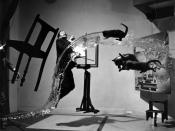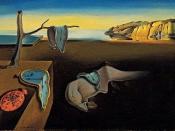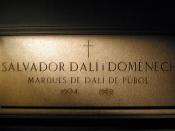"The difference between the surrealists and me is that I am a surrealist"�(Dali 11).
To Salvador Dali, surrealism is simply Salvador Dali, but others have other ideas.
Andre Breton in Surrealist Manifest describes it as a pure psychic automatism "" the absence of all control exercised by reason. Herbert Read calls it the part of the human floating through time, only partly above the level of the consciousness, like an iceberg. Even though Salvador Dali is one of the most famous surrealist artists, because of his extremeness and controversial personality, he was rejected by the surrealist movement itself.
Surrealism is identified as a twentieth-century movement in art and literature which claims to find a "super reality"� in the objects of subliminal mental reality. It is sharply opposed to both naturalism and to purely abstract painting. It was influenced by Freud's psychoanalysis, and its main topic is dreams. Surrealism from the beginning excluded the rational and the logical in favor of the irrational.
Andre Breton was considered to be the father of the movement. His fellow-campaigners were Miro, Luis Aragon, Paul Eluard, Max Ernst, Rene Magritte, Juan Gris, Giorgio de Chirico, and others.
Salvador Dali shared the surrealists' faith in that adapting the automatic process to painting, in recording the unintentional images inspired by dreams. He also saw that, for the imagery to achieve its full potentiality, it had to be developed in a fully conscious way. Contemporary surrealist painter Conroy Maddox, Oxford University graduate notes, ""æhe sought to elaborate his psychic revelations with all the precision and artistic skill at his command, in a conscious and deliberate manner"�(36).
Salvador Domenech Dali was born on May 11, 1904, in the small town of Figueres, in the Catalonia region of northeastern Spain. His mother, Felipa Domenich Ferres (1874-1921), was from...


